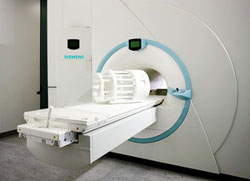Strong magnetic fields for new insights into the brain

The MRTs are to be dedicated to the renowned research project Brains Unlimited, whose objective is to further investigate how the human brain functions. Siemens delivers one of the worldwide most powerful MRT systems with a magnetic field strength of 9.4 Tesla*, as well as two systems with three and seven* Tesla, respectively.
Currently, Siemens is the only company capable of supplying a 9.4 Tesla* MRT system for human research. Its magnetic field is nearly 200,000 times stronger than that of the earth and it is significantly more powerful than the 1.5 Tesla of standard MRT devices for clinical routine. The ultra-high-field system helps research scientists to detect much more details from inside the human body and identify brain structures and functions that exist on a microscopic scale.
Using these research studies, scientists hope to obtain greater insight into the causes of serious illnesses such as multiple sclerosis, Alzheimer’s disease, Parkinson’s disease, epilepsy, and into the growth of tumors. In addition, the causes of behavioral changes, disorders such as difficulties in reading and writing (dyslexia), and attention deficit hyperactivity disorder (ADHD-ADD) will be investigated. Among further research projects, the university plans to use the systems to investigate how the structure of musicians’ ears differs from that of other people.
The order was one of the largest of this type in the history of Siemens Healthcare in the Netherlands and includes the construction of a special building to accommodate the three MRT systems. The Brains Unlimited project is an initiative from the M-BIC (Maastricht Brain Imaging Center). The M-BIC is part of the Faculty of Psychology and Neuroscience and works closely together with brain scientists at Maastricht University Medical Center. Brains Unlimited is funded by the European Union, the Province of Limburg, and the Municipality of Maastricht. * CAUTION – Investigational Device. Limited by Federal law to investigational use.
Media Contact
More Information:
http://www.siemens.com/researchnewsAll latest news from the category: Medical Engineering
The development of medical equipment, products and technical procedures is characterized by high research and development costs in a variety of fields related to the study of human medicine.
innovations-report provides informative and stimulating reports and articles on topics ranging from imaging processes, cell and tissue techniques, optical techniques, implants, orthopedic aids, clinical and medical office equipment, dialysis systems and x-ray/radiation monitoring devices to endoscopy, ultrasound, surgical techniques, and dental materials.
Newest articles

Properties of new materials for microchips
… can now be measured well. Reseachers of Delft University of Technology demonstrated measuring performance properties of ultrathin silicon membranes. Making ever smaller and more powerful chips requires new ultrathin…

Floating solar’s potential
… to support sustainable development by addressing climate, water, and energy goals holistically. A new study published this week in Nature Energy raises the potential for floating solar photovoltaics (FPV)…

Skyrmions move at record speeds
… a step towards the computing of the future. An international research team led by scientists from the CNRS1 has discovered that the magnetic nanobubbles2 known as skyrmions can be…





















